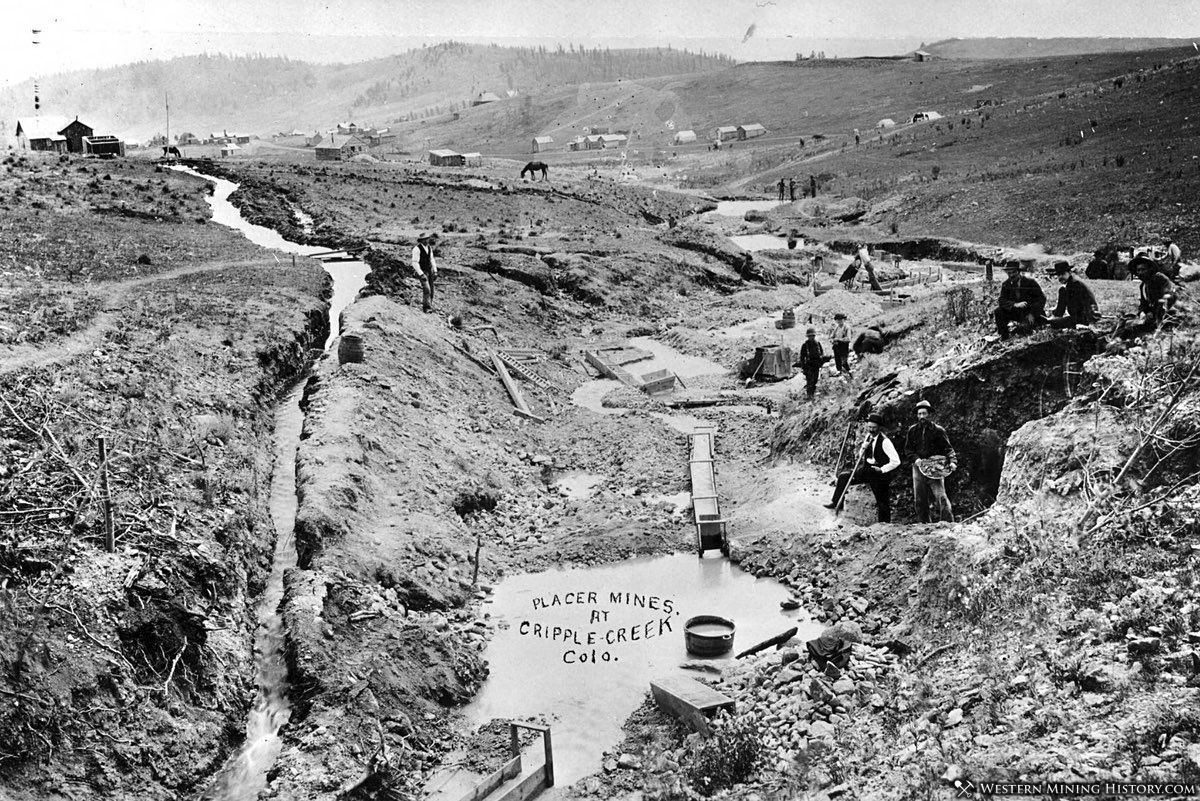The Gem Park District is a vermiculite, nickel, thorium, niobium (columbium), iron, and ree mine located in Fremont county, Colorado.
About the MRDS Data:
All mine locations were obtained from the USGS Mineral Resources Data System. The locations and other information in this database have not been verified for accuracy. It should be assumed that all mines are on private property.
Mine Info
Elevation:
Commodity: Vermiculite, Nickel, Thorium, Niobium (Columbium), Iron, REE
Lat, Long: 38.26833, -105.54639
Map: View on Google Maps
Gem Park District MRDS details
Site Name
Primary: Gem Park District
Commodity
Primary: Vermiculite
Primary: Nickel
Primary: Thorium
Primary: Niobium (Columbium)
Primary: Iron
Primary: REE
Secondary: Copper
Secondary: Phosphorus-Phosphates
Secondary: Silver
Secondary: Cobalt
Location
State: Colorado
County: Fremont
District: Gem Park District
Land Status
Not available
Holdings
Not available
Workings
Not available
Ownership
Not available
Production
Not available
Deposit
Record Type: District
Operation Category: Past Producer
Operation Type: Unknown
Years of Production:
Organization:
Significant:
Physiography
Not available
Mineral Deposit Model
Not available
Orebody
Not available
Structure
Type: L
Description: alkalic igneous complex;
Alterations
Alteration Type: L
Alteration Text: fenitization
Rocks
Name: Intrusive Carbonatite
Role: Host
Age Type: Host Rock
Age Young: Cambrian
Name: Gabbro
Role: Host
Age Type: Host Rock
Age Young: Cambrian
Name: Pyroxenite
Role: Host
Age Type: Host Rock
Age Young: Cambrian
Analytical Data
Not available
Materials
Not available
Comments
Comment (Commodity): The "Mag Lode" prospect contains titanium-bearing iron ore. It is possibly titaniferous magnetite similar to that at Iron Mountain which is about seven miles northeast of the Gem Park district in the McClure Mountain igneous complex.
Comment (Geology): Cambrian mafic and ultramafic alkalic complex.
Comment (Location): On the Custer County - Fremont County border. Wet Mountains.
Comment (Location): Basically coincident with the Gem Park igneous complex.
Comment (Production): A significant tonnage of vermiculite has been produced from the Goldenite and Silverite mines (Bush, 1951). Small amounts of nickel, copper (?), and silver were produced from the Gem Mine in the 1800s.
Comment (Reserve-Resource): Reserves/resources not defined.
Comment (Commodity): Parker and Sharp (1970) believe that a significant niobium-REE-thorium deposit may lie within a carbonatite mass that they postulate lies beneath the fenitized mass at the Vermiculite Mine in this district.
Comment (Commodity): Copper and nickel occur in the area but have not been sufficiently evaluated. Copper occurs as chalcopyrite in coarse pyroxenite at the periphery of the Gem Park complex, in fenitized rock at the Vermiculite Mine, and in a few carbonatite dikes. The "Gem Mine" on the northern periphery of the district contains nickel, copper, silver, and cobalt. Minerals there include niccolite, annabergite, and native silver. It was mined in the 1800s (Cappa, 1998).
Comment (Commodity): The "Goldenite" and "Silverite" mines are part of a large, blanket-like vermiculite deposit (Bush, 1951). A large tonnage of material was produced in the past and is of a good grade.
Comment (Commodity): Armbrustmacher and others (1988) report detailed mineralogy of carbonatites from drill core.
References
Reference (Geology): Parker, R.L., and Sharp, W.N., 1970, Mafic-ultramafic igneous rocks and associated carbonatites of the Gem Park Complex, Custer and Fremont counties, Colorado: U.S. Geological Survey Professional Paper 649, 24 p.
Reference (Deposit): Bush, A.L., 1951, Sources of lightweight aggregate in Colorado: Colorado Scientific Society Proceedings, v. 15, no. 8, p.338.
Reference (Geology): Christman, R. A., Brock, M. R., Pearson, R. C., and Singewald, Q. D., 1959, Geology and thorium deposits of the Wet Mountains, Colorado - a progress report: U.S. Geological Survey Bulletin 1072-H, p. 491-535.
Reference (Geology): Cappa, J. A., 1998, Alkalic igneous rocks of Colorado and their associated ore deposits: Colorado Geological Survey Resource Series 35, 138 p.
Reference (Geology): Armbrustmacher, T.J., 1984, Alkaline rock complexes in the Wet Mountains area, Custer and Fremont counties, Colorado: U.S. Geological Survey Professional Paper 1269, 33 p.
Reference (Deposit): Armbrustmacher, T.J., 1988, Geology and resources of thorium and associated elements in the Wet Mountains area, Fremont and Custer counties, Colorado: U.S. Geological Survey Professional Paper 1049-F, 34 p.
Colorado Mining Photos
Check out this collection of Colorado's best historic mining photos: Incredible Photos of Colorado Mining Scenes.
